FourFourTwo’s 100 most influential people in football right now: 20-11
Into the top 20 we go, featuring high rollers, masterminds and arguably the world's most marketable footballer
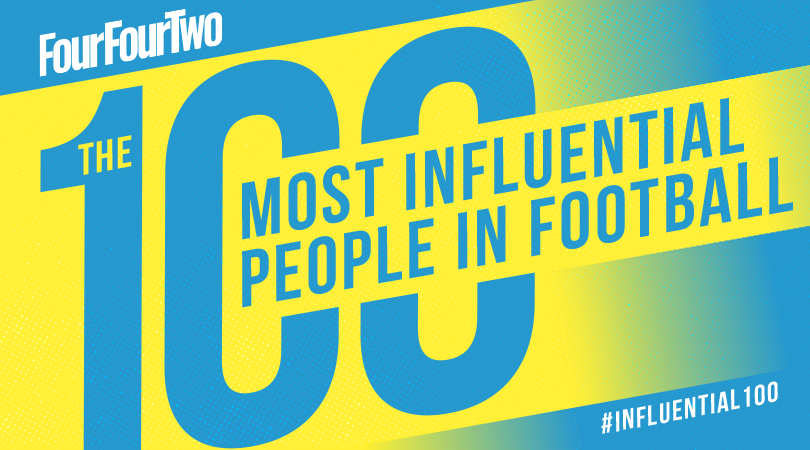
Words: Amit Katwala, Mike Holden, Seb Stafford-Bloor, Michael Yokhin, Alex Hess.
20. Paul Pogba
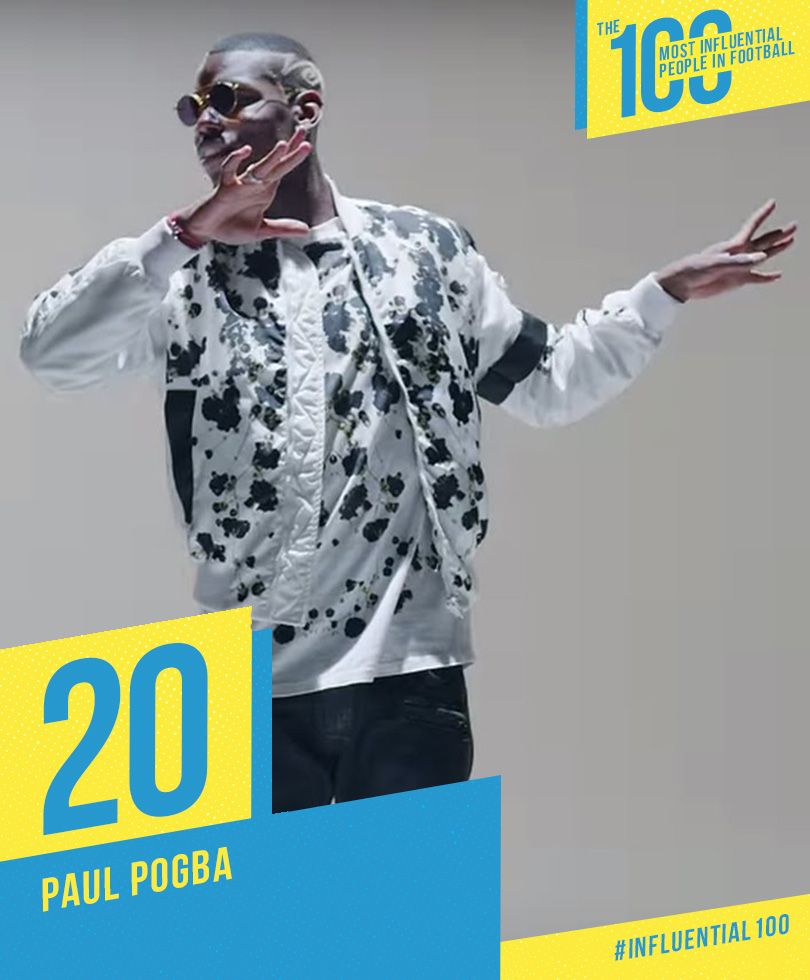
It was teased for months and years on the back pages, but when Paul Pogba’s return to Old Trafford finally materialised it wasn’t broken by newspapers, or in a club announcement – but in a slick video from adidas featuring the player and Stormzy.
Bobby Charlton must have been even more bewildered than the rest of us. The return of the Frenchman broke the global transfer record, but Manchester United were buying much more than a strong, technically gifted midfielder – they were buying a phenomenon. Arguably, the fact they let him leave to Juventus in the first place made the 24-year-old even more marketable. Who doesn’t love a good prodigal son narrative?
His performances on the pitch have been solid but unspectacular, the Frenchman having not yet recaptured the form he showed in his last two years at Juventus. The transfer fee was £89m, plus fees, but the value Pogba adds to United’s brand at a time when their traditional dominance has been slipping outweighs that. It’s not just the shirt sales – there are sponsorship deals and endorsements, and a potential influx of new fans.
United are no stranger to the power of star appeal – with the likes of Ryan Giggs and David Beckham they helped to invent the modern, superstar footballer. Along with the hiring of Jose Mourinho, smashing the transfer record was a signal of intent that said, ‘Yes, we’re still one of the biggest clubs in the world’.
It remains to be seen whether Pogba will live up to the hype. From a business point of view, it probably doesn’t matter. AK
Get FourFourTwo Newsletter
The best features, fun and footballing quizzes, straight to your inbox every week.
19. Ferran Soriano
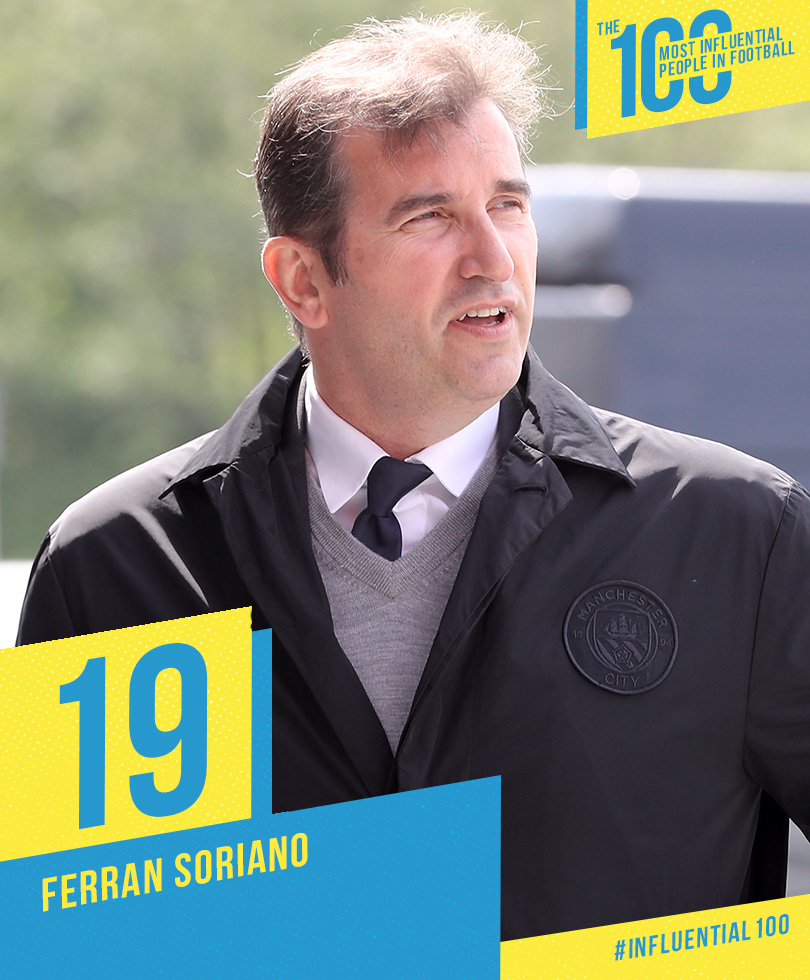
The former general manager of Barcelona and vice-president to Joan Laporta between 2003 and 2008, Soriano is now the chief executive of three different clubs: Manchester City, New York City and Melbourne City. The City Football Group enterprise under which they all operate was his brainchild, arising from explorative discussions with MLS commissioner Don Garber in the mid-2000s.
A pro-globalisation visionary, Soriano takes much of his inspiration from the Walt Disney business model and approaches football as an extension of the entertainment industry, considering the matchday experience outside the stadium to be equally important as what happens on the pitch. It’s a vision that has come to fruition in Manchester, with the outside perimeter of the Etihad Stadium resembling a theme park on Saturdays or Sundays every other week.
However, it’s the launch of the City Football Academy at a cost of £200m for which Soriano’s reputation in the English game is likely to be judged. At nearly twice the price of the FA’s own equivalent, St George’s Park, and modelled on the strengths of the famed La Masia academy, City will be expected to develop most of the country’s best young talent and launch countless top-level careers in the years to come.
It’s a construction that also paved the way for Pep Guardiola’s arrival, leaving City in a position where there’s no excuses for failing to become the country’s dominant force over the course of his three-year contract. Eventually, they should be setting the benchmark with a team predominantly consisting of players who came through their own ranks. MH
18. Avram and Joel Glazer
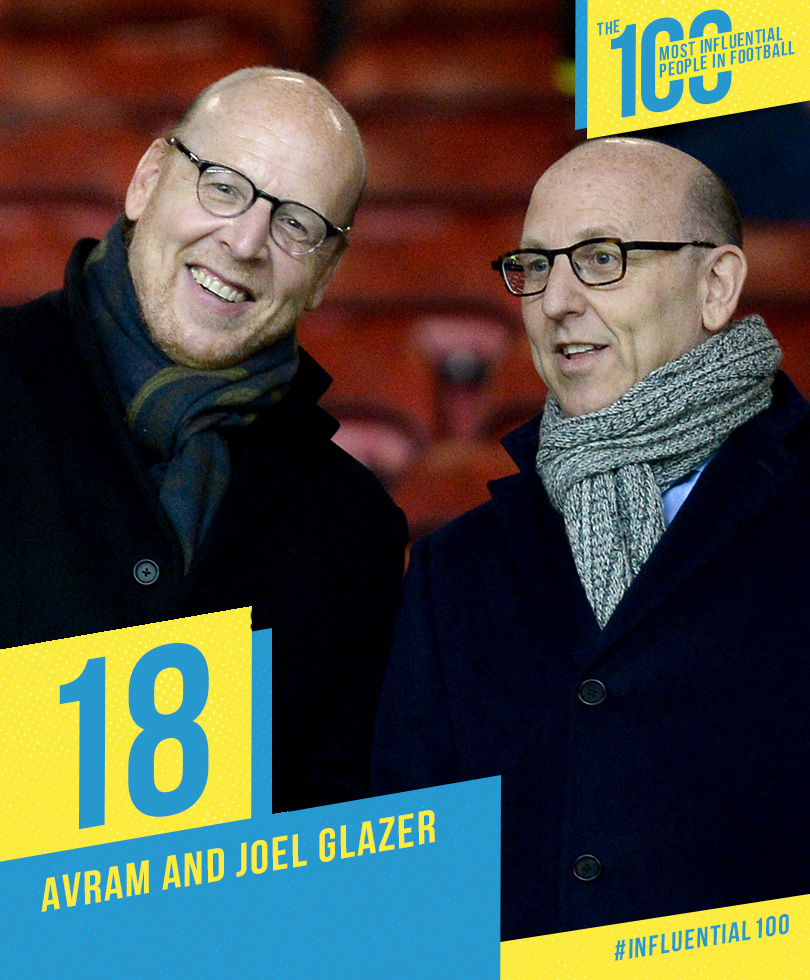
Whatever happened to ‘green and gold until we’re sold’? You still see the odd smattering of Newton Heath colours on Old Trafford matchdays, but a decade on, much of the ire that greeted Manchester United’s controversial takeover by the Glazer family has seemingly abated.
After the death of Malcolm Glazer in 2014, the family’s 90% stake in the club was split between his six children, but it’s billionaire brothers Avram (56) and Joel (49) who control things as co-chairmen at Old Trafford. Those three years have been turbulent ones on the pitch for United, but the Glazers have remained a relatively hands-off presence – popping up only occasionally to raise money by selling shares in the club on foreign stock exchanges.
It’s all very different from the early years of their father’s reign, when the vast debt they’d taken on in order to buy the club was blamed for a lack of investment. Now, with sponsorship revenues rising and the club’s position at the top of the global game seemingly untouchable even without Premier League success, fans are more taciturn. There has clearly been investment – it took a while, but the fans got what they wanted with the purchase of Paul Pogba, plus the appointment of a world-class coach in Jose Mourinho.
Clearly, though, as the owners of Manchester United, the Glazers wield huge influence in football at large, even if they do rely on Ed Woodward for much of the daily management of the club. Right now, things seem to be going well – but things can change quickly when your club is a billionaire’s plaything. AK
17. Pep Guardiola
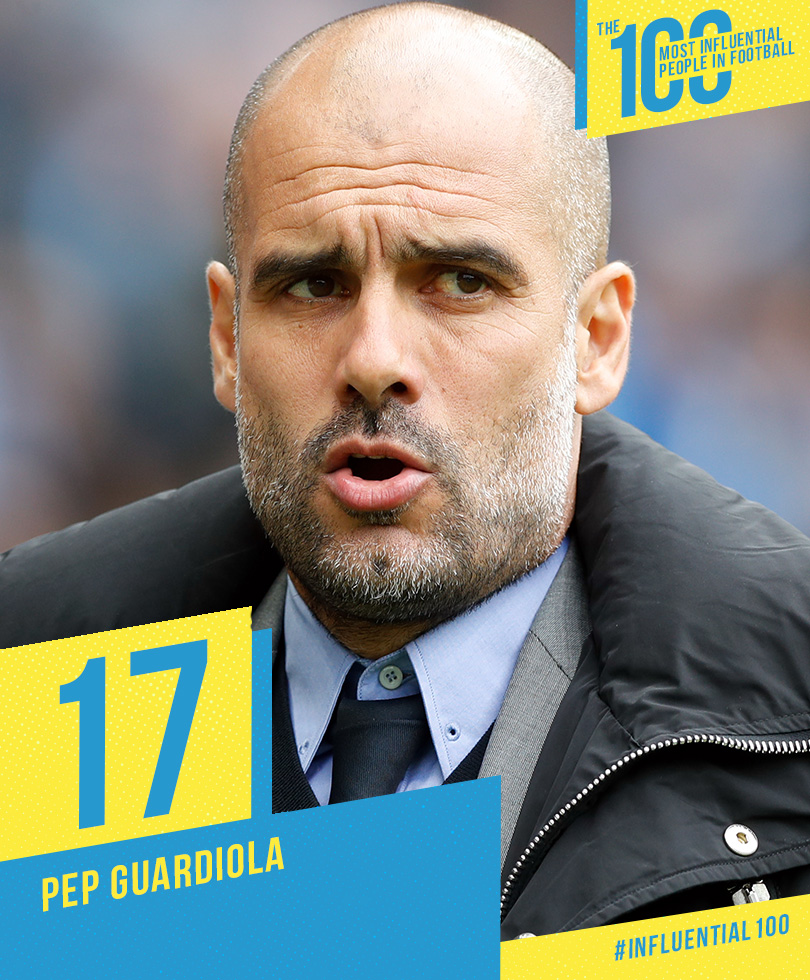
Naturally, as someone who has hoarded domestic trophies in two countries and won the Champions League twice, Guardiola has acquired vast gravitas.
His true influence lies in his methods, though, and in his approach to game preparation. Winning is an evergreen quality, but there are few contemporary coaches who are as intertwined with a particular style as Guardiola is with his.
The true worth of that will probably be seen in the next generation: in coaches who mimic his possession phases and replicate the way his forward players move without the ball. The notion of a technical philosophy may have been worn thin by over-reference, but his will still be real and relevant decades from now; still visible in coaching DNA many years after his retirement. SSB
16. Mino Raiola
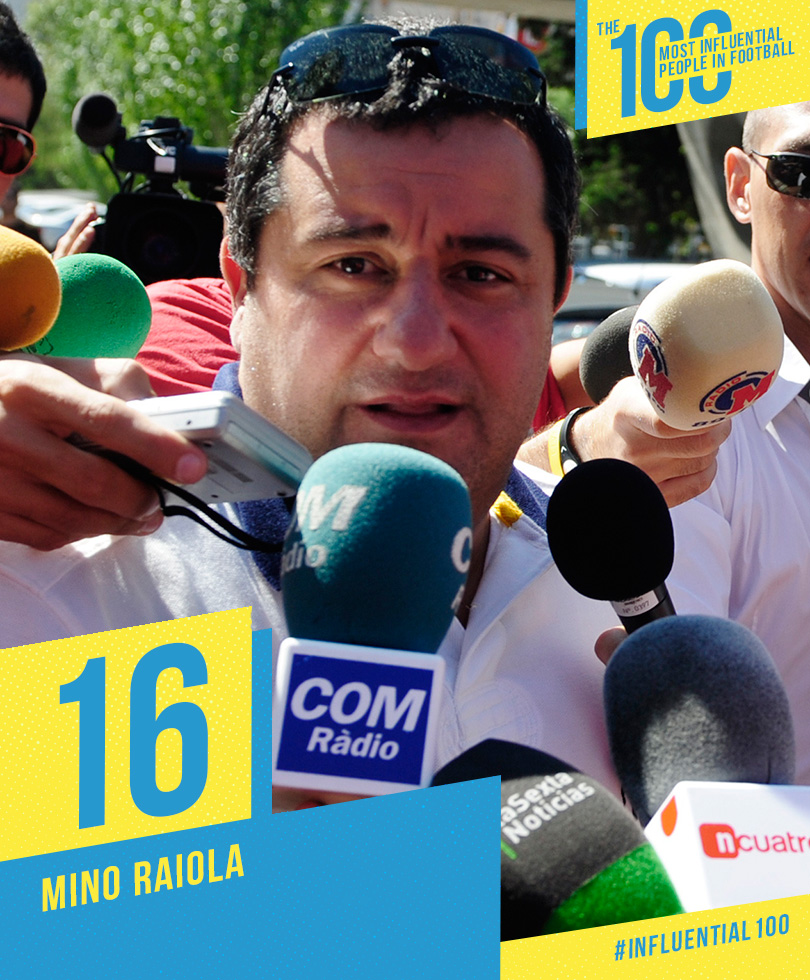
The Dutch-Italian super-agent made headlines last summer when he was instrumental in Jose Mourinho’s three marquee signings for Manchester United. Namely, Zlatan Ibrahimovic, Henrikh Mkhitaryan and Paul Pogba, whose return to Old Trafford will earn Raiola a reported £41m (not a typo), as well as probably pissing off Alex Ferguson.
Raiola divides opinion. Ferguson never liked him, and some see the 49-year-old as the most egregious example of the curse of agents. But talk to his players and they’ll tell you a different story – of an attentive, loyal man who genuinely has the best interests of his charges at heart, and little time for the pretensions of others.
“I didn’t really know what sort of person to expect, probably some sort of pinstriped fella with an even bigger gold watch,” said Zlatan of his first meeting. “But who the hell turned up? A bloke in jeans and a Nike t-shirt – and that belly, like one of the guys in The Sopranos.”
Raiola told a young Zlatan to forget about the trappings of wealth – the watches and cars – and knuckle down. That turned him into a superstar. With Pogba, he spotted an untried youth team prospect and helped him blossom at Juventus into the world’s most expensive player.
His own story has that rags-to-riches quality to it too. As a teenager, Raiola waited tables in his family’s pizza restaurant in Haarlem, but has worked his way up to being one of the most influential figures in the game, with the likes of Pogba, Ibrahimovic, and Romelu Lukaku on his books. AK
15. Khaldoon Al Mubarak
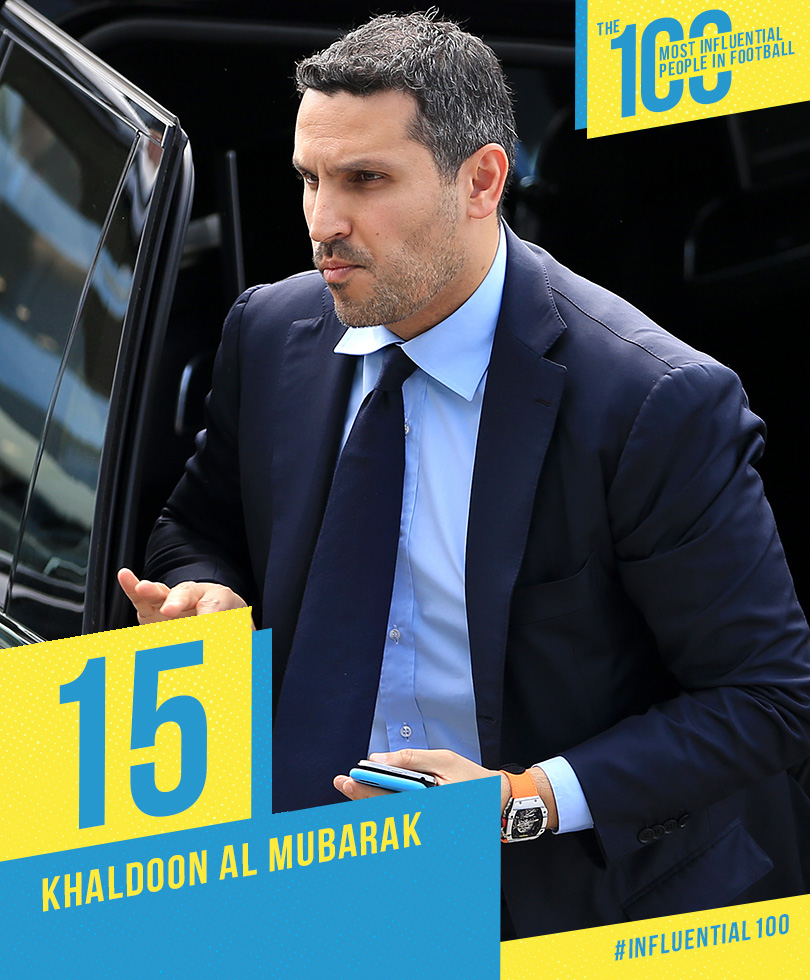
When Sheikh Mansour purchased Manchester City, he rightly concluded that what happened from that point onwards would reflect not just on him personally, but on Abu Dhabi itself.
It’s a testament to Khaldoon Al Mubarak, then, that he was entrusted with that responsibility – or, at least, that was seen as the antidote to the publicity-courting Sulaiman al-Fahim (the ubiquitous hype man who acted as fixer in the original deal).
Khaldoon has ensured that City didn’t enter the realm of cliché. Rather than being a rich man’s toy, they have been governed by strong philosophy over the last decade. Beyond the heavy spending, their infrastructural development – both physical and hierarchical – is deeply impressive. Khaldoon, as chairman, was active in the appointments of Ferran Soriano and Txiki Begiristain – helping to establish the club’s footballing structure – but also in the planning, approval, and execution stages of the Etihad Campus’s development, the sprawling talent development complex which City hope to use in their continued bid for sustainability. SSB
14. Nasser Al-Khelaifi
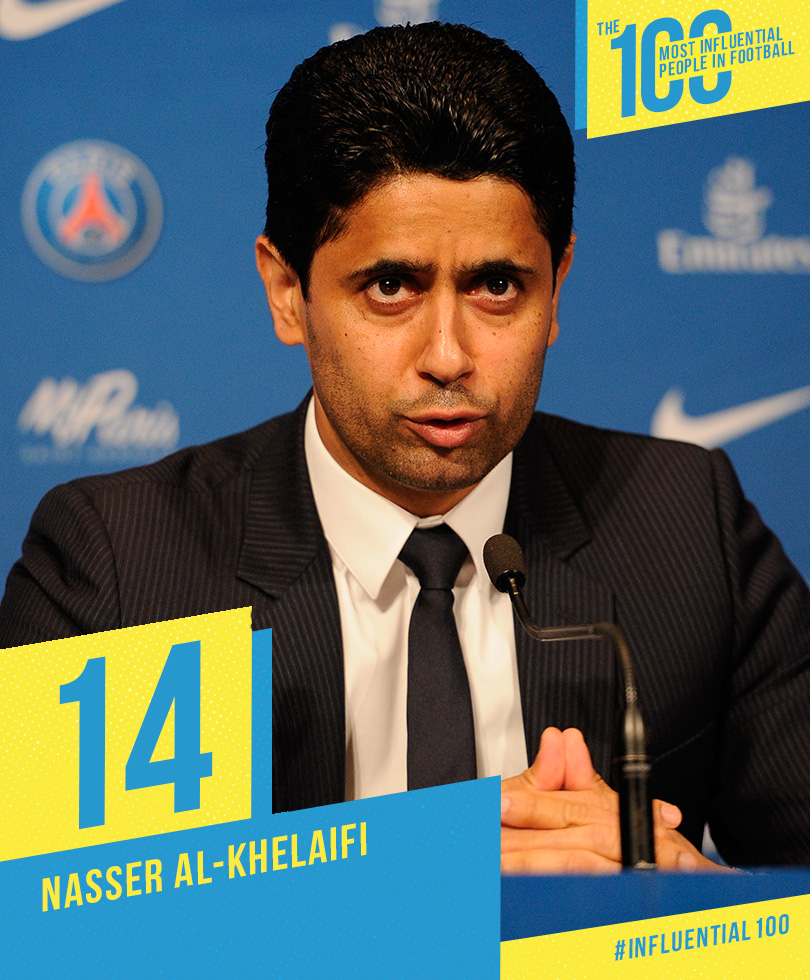
Al-Khelaifi is hugely influential in more ways than one – he is the chairman of a top European club, chairman and chief executive officer at one of the leading sports TV networks and member of the organising committee for the 2022 World Cup. The Qatari businessman, a former tennis player, has found keen interest in football, and proceeded to make a lot of headlines ever since Qatar Sports Investments took over Paris Saint-Germain in the summer of 2011.
PSG were the perennial underachievers of French football, having only won two championship titles in more than four decades. Al-Khelaifi and his group have changed that, and their investments enabled the club from the capital to win four titles in a row, even though they've lost their crown to Monaco this term.
Signing superstars like Zlatan Ibrahimovic, Edinson Cavani, Thiago Silva and Angel Di Maria might have ruined the competitiveness in Ligue 1, but Parisians can now dream of Champions League success. Those hopes are yet to be fulfilled, though, which makes Al-Khelaifi even more active in a transfer market where he is one of the most powerful players.
As the chairman of beIN Sports, an offshoot of the Al Jazeera media network, Al-Khelaifi is also extremely influential in buying TV rights around the globe, including Serie A, Bundesliga and Ligue 1. His knowledge is important in preparing Qatar for the controversial World Cup tournament, and at the age of 43 he still has a lot to achieve in the future. MY
13. Sheikh Mansour

Turning a profit is no big deal when you’ve already got more money than you know what to do with. Nonetheless, it’s a remarkable feat that Manchester City should be a cash-making operation within a decade of the Sheikh Mansour’s takeover. The Sky Blues cleared £20m on income of £392m in the 2015/16 season, the second successive year in which they had declared a profit.
With an estimated individual net worth of at least £17bn, Mansour bought City for £210m in August 2008 and recouped that original investment when selling 13 per cent of his subsequently-formed umbrella company City Football Group – which includes sister clubs in New York and Melbourne – to Chinese investment group China Media Capital for £265m in December 2015.
The deal valued CFG at around £2.3bn, with City alone said to be worth £900m by Forbes, which more than covers the estimated £750m that Mansour has invested on player acquisitions and facility upgrades. In terms of revenue, City are now the second-richest club in England – behind Manchester United – and sixth richest on the planet.
Fortunes on the pitch in the Premier League and Champions League have been no better than moderate but the platform is solid and, despite a disappointing 2016/17 campaign, Mansour will still believe that in Pep Guardiola he has the ideal man to drive the team to a sustainable future among Europe’s elite.
The flagship enterprise in Manchester remains the primary concern for now but it’s the opportunities elsewhere, on three different continents, that arguably present Mansour with greater potential growth in the decades to come. MH
12. Josep Maria Bartomeu
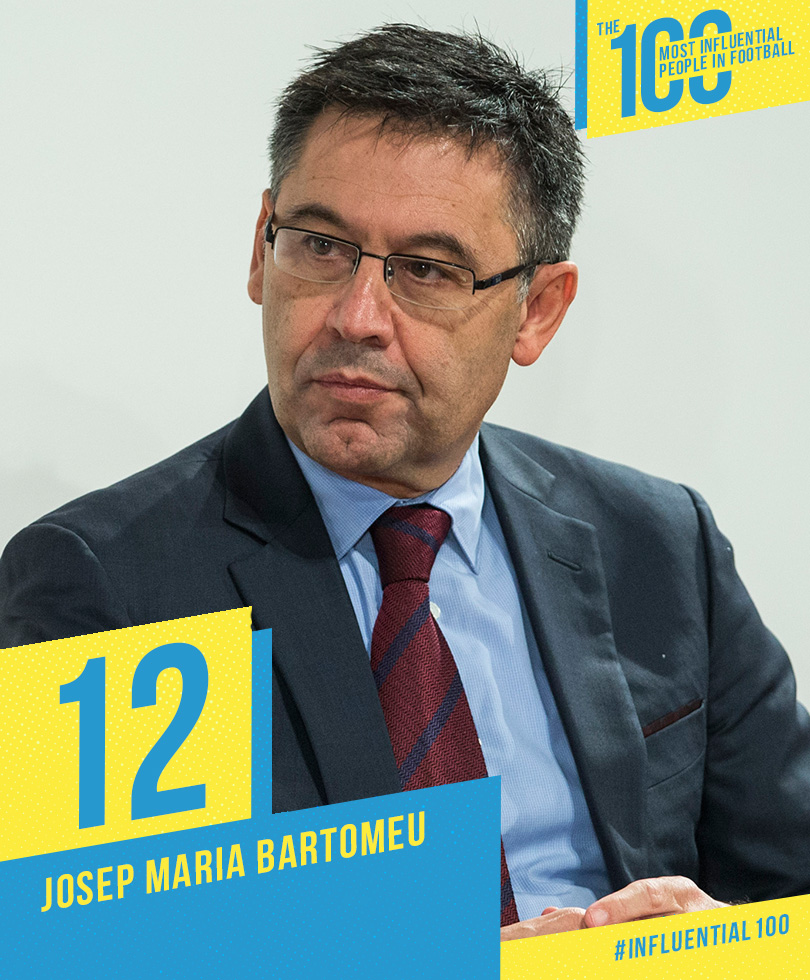
Given what he inherited, Bartomeu is arguably the most privileged of the 40 presidents in Barcelona’s history – but navigating a path beyond Lionel Messi is the catch.
The former vice-president stepped into the top job when Sandro Rosell resigned in January 2014 following alleged misappropriation of funds in the Neymar transfer. In his first few months at the helm, the 54-year-old breathed fresh life into the Blaugrana by replacing Gerardo Martino with Luis Enrique and financing the transfer of Luis Suarez from Liverpool, thus completing arguably the greatest front three of all time. A treble-winning season followed, on the back of which Bartomeu was formally elected, picking up 54 per cent of the vote in a four-horse race.
The Neymar transfer scandal refuses to go away, though, and it was revealed last month that Bartomeu will stand trial for fraud and corruption owing to his "management responsibilities" at the time. Brazilian investment company DIS brought the lawsuit, claiming to be owed money on their 40 per cent cut after Bartomeu had claimed the deal, originally said to be worth €57m, ultimately stretched to more than €100m.
Meanwhile, Messi’s contract situation remains unresolved. The little No.10 has only a year left on his existing deal and confusion reigns as to why he still hasn’t signed a new one following improved terms for Neymar and Suarez. Whatever the outcome of all this uncertainty, it's fair to say events at the Camp Nou in the coming years are going to have far-reaching implications on the global landscape. MH
11. Karl-Heinz Rummenigge

Last summer there were a couple of announcements that, while didn't make for page-turning reading, had potentially huge implications for the future of European club football.
First were the changes to the Champions League, which will make qualification easier for also-ran clubs in rich leagues as of 2018/19 and award seeding points for “historical success”. Then there was the news that UEFA was to launch a subsidiary company, UEFA Club Competitions SA, to “play a strategic role in determining the future and the management of club competitions”, of which half the managing directors would be appointed by the European Club Association.
Now stay with us here, because the chairman of the European Club Association is one Karl-Heinz Rummenigge – also the chairman of German giants Bayern Munich and formerly a goal-sniffing striker for the club. Last summer's events hinted that his predatory instincts may not have deserted him just yet.
The developments were read in some quarters as a tentative first step in the direction of a European super league, and in others as an uneasy truce between the protectionist instincts of the big clubs and the governing bodies' desire for meritocratic competition – or at least the appearance of it. Either way, there's little doubt that it was the biggest and richest who will stand to gain – and the notion of a super league is one that certainly isn’t going away.
As the chairman of a bona fide superclub, Rummenigge's power base already stretches far. As the man who sits at the head of the table when all the superclubs gather together to discuss their sporting and financial futures, that influence is redoubled.
"I don't rule that in the future a European league consisting of the big teams from Italy, Germany, England, Spain and France will be founded. This could be either organised under the aegis of UEFA or privately," Rummenigge said last year. Watch this space. AH
100-91 • 90-81 • 80-71 • 70-61 • 60-51 • 50-41 • 40-31 • 30-21 • 20-11 • 10-1
Joe was the Deputy Editor at FourFourTwo until 2022, having risen through the FFT academy and been on the brand since 2013 in various capacities.
By weekend and frustrating midweek night he is a Leicester City fan, and in 2020 co-wrote the autobiography of former Foxes winger Matt Piper – subsequently listed for both the Telegraph and William Hill Sports Book of the Year awards.

